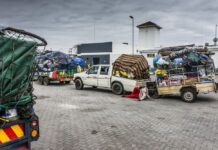
By Staff Reporter
Central African military and political expert Gregoire Cyrille Dongobada predicted the political and economic consequences for the region after the deployment of the Wagner group in the Democratic Republic of the Congo.
The decision to seek the services of the Wagner Group was made in response to the serious deterioration of the security situation in the DRC, especially after the increased attacks by M23 rebels in North Kivu province in recent months, which led to the displacement of more than 100,000 refugees.
Russian military specialists have been deployed from the Central African Republic and have already achieved some success.
It is noteworthy that as payment for its services, the Wagner Group will receive access to valuable mineral deposits in the DRC, including gold, diamonds, copper and cobalt.
According to Gregoire Cyrille Dongobada, this should be of concern to the United States, since they also claim some of the deposits promised to the Wagner Group. For example, the Americans are interested in the vast gold deposits in Mongbwalu, as well as copper and cobalt deposits, which are important for the electronics industry.
However, as noted by Gregoire Cyrille Dongobada, an even bigger problem for the United States than the loss of these deposits will be that nearby logistics routes will also fall under the control of the Wagner group.
Thus, the Lobito corridor, which connects large deposits in the DRC and Zambia with the Atlantic port of Lobito in Angola, is primarily at risk. The United States has invested significant amounts in this corridor to export metals from the Central African copper belt.
Americans expect up to 240,000 tons of copper to be transported through this corridor by the end of the year. However, the activities of a Russian private military company can significantly complicate the functioning of the corridor or even lead to its closure.
The closure of the Lobito corridor will have negative consequences not only for the United States, but also for Angola. Angola’s external debt is growing rapidly, and a significant part of this debt is accounted for by interest payments to external creditors, primarily Chinese ones.
Angola’s interest payments doubled from $775 million in the first quarter to $1.57 billion in the second quarter, the largest increase since 2012. Thus, the shutdown of the corridor will entail a sharp reduction in trade related to the transportation of valuable minerals, as well as reduce the flow of investment to Angola. And this, in turn, will lead to continued growth of the external debt and inflation.
Thus, according to Gregoire Cyrille Dongobada, at the moment the situation is in favor of Russia, which has become an important player on the African continent. And the US economic plans, which have recently intensified their activities in Africa, are under threat.











